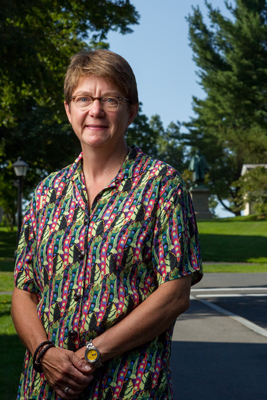October 17, 2014
By Madeline Ruoff ’18

Amherst Professor Martha Umphrey
The Supreme Court’s decision to let stand appeals court decisions regarding same-sex marriage this October has catalyzed the removal of gay marriage bans across the nation. Amherst professor Martha Umphrey, an expert on the legal issues around gay marriage, gives her analysis on what this means for the future of marriage equality in the United States.
Umphrey—the Bertrand H. Snell 1894 Professor in American Government at the College— says the Supreme Court’s silence was a “statement in itself.” She proposes a variety of reasons that individual justices may not have wanted to take a gay marriage case. Some may have feared a federal ban, others federal legalization; some may have felt there was too little controversy to warrant taking a case; others may have feared the controversy that would have followed a decision.
So, there is no clear Supreme Court decision regarding gay marriage. Its June 2013 decision US v. Windsor, which overturned the Defense of Marriage Act, is “not fully coherent from a legal perspective,” Umphrey says. However, it “includes language of both equality and dignity, which the lower courts ran with” in overturning gay marriage in their jurisdictions.
The “effect of this [2014] non-decision” is in fact a decision, Umphrey says. At the moment, 29 states and Washington, D.C., allow gay marriage. Still, the battle for marriage equality is not over.
While the Supreme Court’s silence allows gay marriage to stand where it has already been legalized, Umphrey says, the “gay and lesbian community still doesn’t have its Brown v. Board of Education, a case that states clearly and in constitutional language that it’s unconstitutional for states to discriminate on the basis of sexuality.”
Furthermore, same-sex marriage, as Umphrey puts it, is not the “Holy Grail of equality — it doesn’t help all the people who don’t want to get married.” She believes there is still much work to be done toward equality; in many states, for example, employers are still allowed to discriminate on the basis of sexuality.
However, Umphrey feels it is “inevitable” that marriage equality will spread over the whole country within a few years. As gay marriage becomes increasingly common, it becomes more and more difficult for the court to ban it; it would be analogous to banning interracial marriage today.
In the past, same-sex marriage has been legalized on a state-by-state basis, but Federal Court of Appeals decisions apply to an entire circuit. “I don’t know the final timeline for marriage equality, but it should be quick,” Umphrey says. “That’s the way the wind’s blowing.”